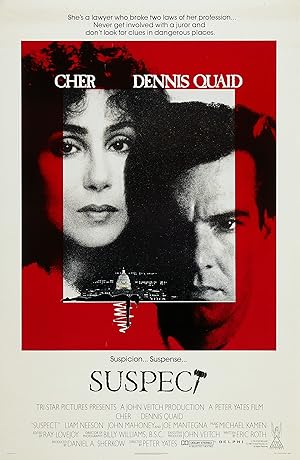
Suspect Page #3
- R
- Year:
- 1987
- 121 min
- 681 Views
listening to my own voice since five.
I know the feeling.
There's a vote coming up
on a bill that I co-sponsored.
I have a knot in my stomach like a fist.
Closer the vote, tighter the fist.
Grabs me a little lower.
How close is the vote?
Well, if everything falls right,
I never noticed that. Your eyes
are sometimes blue, sometimes green.
- I told you, my vote's not for sale.
- I can't help myself, Grace.
But it's a lovely thought.
Nobody has mentioned my eyes
in a long time.
- There's another stop.
- How much do I owe you?
- Seven fifty.
- Here. Keep the change.
Michael, you are sewed.
His face was completely rearranged
and he spent the night in surgery.
When the police arrived,
the assailant had fled.
I need a continuance until this
Michael John Guthridge is caught.
I see no need for a continuance.
The subject was sewed a subpoena.
He's required to appear.
You've got to be joking.
There's not a chance in hell
that this man will appear.
I'm sorry, Your Honor.
I can sympathize with you.
I was a trial attorney myself.
At the mercy of witnesses.
But if we waited for every witness,
the system would grind to a halt.
It could take months to locate him.
And there's no guarantee he'll testify
or have anything to testify about.
In fairness to my client I can't present
a complete defense without this witness.
I'm sorry. Your request
for a continuance is denied.
Miss Riley?
Do not contaminate the process with
comments about this witness in court.
How can I possibly
contaminate this process?
Opening statements, Mr. Stella?
Elizabeth Rose Quinn.
She was twenty-four.
A clerk typist
at the Justice Department.
She made 17,000 dollars a year.
She was single.
She liked to play tennis.
She was a member of
the First Baptist Church in Arlington.
She wasn't very important.
Especially in a city that's full
of so many important people.
She was just a decent,
hard-working citizen.
And on the night of December 18th,
a week before Christmas, -
- Carl Wayne Anderson,
in cold blood,-
cut her throat.
I have prosecuted 43 murder cases.
It's always a horror, always senseless.
But of all those murder cases -
- this is the most horrible,
the most senseless, the most indefensible.
For nine dollars.
Nine dollars.
Nine dollars. That's all she had.
Is this what we've become?
Is the value of human life so cheap?
Elizabeth worked late that night.
It was cold. She was tired
and anxious to get home.
She took the bus to the parking lot
where her car was.
That's as far as she got.
We will show that Anderson had been
in that parking lot, breaking into cars.
He had been sleeping
in Elizabeth's car.
And a parking-lot attendant
had chased him away.
But he had come back.
And when he saw Elizabeth
alone and defenseless, -
- he beat her, dragged her down
to the river and killed her.
This isn't the eleven o'clock news.
We can't just shake our heads,
go to bed and forget about it.
We have a responsibility
to Elizabeth Rose Quinn.
She is, after all, too important.
Miss Riley?
Carl Wayne Anderson is not a decent,
hard-working citizen.
He is not a shining example
of the American dream.
Carl Anderson is
the American nightmare.
He's one of the nameless,
faceless derelicts -
- that wander through the streets
of our country by the thousands.
We step over them in doorways.
come in contact with one of them.
We look at them with a mixture
of pity, contempt and fear.
And we choose not to see that
under their ragged, filthy clothes -
- is a frightened, lost human being,
just like you and me.
Carl Anderson was a soldier in Vietnam.
Not a hero, just a dog soldier -
- who believed in
and fought for his country.
And when he tried to regain his -
- identity and self-respect
in a veterans hospital,-
- he contracted spinal meningitis,
became deaf, -
- and suffered
a traumatic speech loss.
Carl Anderson lived in a world
where nine dollars -
- could mean the difference between
eating and starving to death.
They weren't supposed to vote
until next week.
They were ready to adjourn.
The leadership called for the vote.
- What's the count?
- The right yes puts us over the top.
No comment.
You lucked out. Her chairman must
have persuaded Comisky to vote yes.
- That must have been it, Congressman.
- Give me a call.
Nice job, Eddie.
- Could you describe what you found?
- She had been attacked from behind.
Her throat cut laterally across
the larynx and the carotid artery -
from left to right.
- What kind of instrument caused this?
- A very thin, straight blade.
A razor. A knife.
I'm showing you what's been marked as
government exhibit one.
Have you seen this knife before?
Yes. I was asked to do
a forensic examination of it.
And what were your conclusions?
The width and sharpness of the blade
were consistent with the wound.
- I move exhibit one in evidence.
- Without objection.
Your witness.
Before Miss Riley cross-examines,
we'll take a fifteen minute recess.
You're excused, Doctor.
Excuse me, Your Honor. May I have
another look at that photograph?
Objection. This has become
ghoulish beyond purpose.
The juror is entitled to a thorough
examination of the evidence. Overruled.
Thank you.
The jury is not to discuss
this case with anyone.
Okay, let's go.
Miss Riley? There was a call for you.
He didn't leave a name, only a number.
Okay. Thanks.
- Hello?
- This is Kathleen Riley.
Do you know if your client
is right- or left-handed?
Excuse me?
Do you know if Carl is
right- or left-handed?
Who is this?
- I noticed something. Did you?
- I said, who is this?
Dr Koleena, you examined
Carl Anderson's knife, didn't you?
- Yes, I did.
- What did you find?
Some rust, a partial hair follicle
and microscopic traces of human tissue.
And did you compare the tissue taken off
of his knife with Elizabeth Quinn's?
- Yes.
- And what were your findings?
They were inconclusive.
- Could you please speak up?
- They weren't conclusive.
They weren't conclusive.
So what you're saying is that -
- you have no direct evidence
that Carl Anderson's knife -
- was used to murder
Elizabeth Rose Quinn.
No bone fragments, no tissue samples,
no traces of her blood.
The knife had recently
been wiped clean.
Didn't you just say you found rust and
a hair follicle and some tissue on it?
- So was it wiped clean or wasn't it?
- It's more complicated than that.
No, it's not more complicated.
It was either cleaned or it wasn't.
Objection. Miss Riley is making this
sound like a cooking class.
Excuse me?
Objection sustained. Dispense with
your characterizations, Mr. Stella.
My apologies to the court
and to counsel.
Thank you, but I don't want
the jury left with the impression -
- that Mr. Anderson cleaned his knife
to hide incriminating evidence.
Objection sustained.
Translation
Translate and read this script in other languages:
Select another language:
- - Select -
- 简体中文 (Chinese - Simplified)
- 繁體中文 (Chinese - Traditional)
- Español (Spanish)
- Esperanto (Esperanto)
- 日本語 (Japanese)
- Português (Portuguese)
- Deutsch (German)
- العربية (Arabic)
- Français (French)
- Русский (Russian)
- ಕನ್ನಡ (Kannada)
- 한국어 (Korean)
- עברית (Hebrew)
- Gaeilge (Irish)
- Українська (Ukrainian)
- اردو (Urdu)
- Magyar (Hungarian)
- मानक हिन्दी (Hindi)
- Indonesia (Indonesian)
- Italiano (Italian)
- தமிழ் (Tamil)
- Türkçe (Turkish)
- తెలుగు (Telugu)
- ภาษาไทย (Thai)
- Tiếng Việt (Vietnamese)
- Čeština (Czech)
- Polski (Polish)
- Bahasa Indonesia (Indonesian)
- Românește (Romanian)
- Nederlands (Dutch)
- Ελληνικά (Greek)
- Latinum (Latin)
- Svenska (Swedish)
- Dansk (Danish)
- Suomi (Finnish)
- فارسی (Persian)
- ייִדיש (Yiddish)
- հայերեն (Armenian)
- Norsk (Norwegian)
- English (English)
Citation
Use the citation below to add this screenplay to your bibliography:
Style:MLAChicagoAPA
"Suspect" Scripts.com. STANDS4 LLC, 2025. Web. 22 Feb. 2025. <https://www.scripts.com/script/suspect_19194>.







Discuss this script with the community:
Report Comment
We're doing our best to make sure our content is useful, accurate and safe.
If by any chance you spot an inappropriate comment while navigating through our website please use this form to let us know, and we'll take care of it shortly.
Attachment
You need to be logged in to favorite.
Log In